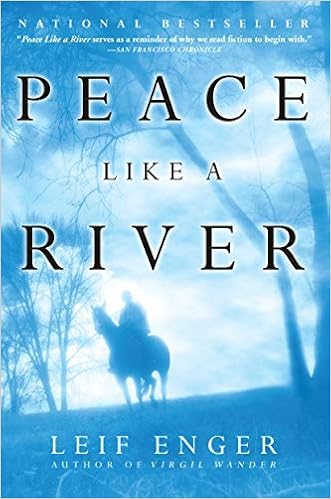
After weeks of writing of the conflicts engulfing America, it’s time for an antidote. Though I think END OF THE RACE is a story of redemption, Leif Enger’s PEACE LIKE A RIVER is a powerful dose of good medicine. An elixir, like breathing deeply of enduring love.
Rather than trying, and failing, to convey a sense of the novel, I’ll defer to others descriptions on the back cover of the book:
“Written in prose tart and crisp as a Minnesota autumn, Peace Like a River, is seductive and deliciously American and there are passages so wondrous and wise you’ll want to claw yourself with pleasure.” –Frank McCourt
“Once you begin Leif Enger’s Peace Like a River, you are carried away by the elemental surge of its story, the sheer eagerness to see what happens to the engrossing characters who exist far from the intrusions of the media in the timeless arena of family love and anguish over a lost member. It is Enger’s gift that he has made their extraordinary world credible.” –Jim Harrison
“Peace Like a River is that loveliest of gifts, a truly great book, into which the reader can sink deliciously and completely. The characters fill the reader’s days and nights; and in the reading of it, we cross over into amazing territory.” –Rick Bass
“… Peace Like a River is an exceptionally heartfelt and moving tale about the resilience of family relationships … told through the prism of memory. … Enger’s profound understanding of human nature stands behind his compelling prose.” –Booklist (Starred Review)
According to the book flap:
“Leif Enger’s debut is an extraordinary novel—an epic of generosity and heart that reminds us of the restorative power of great literature. The story of a father raising his three children in 1960’s Minnesota, Peace Like a River is at once a heroic quest, a tragedy, a love story, and a haunting meditation of the possibility of magic in the everyday world.”
If you are a writer, Enger’s novel will make you sit back and sigh, “Oh, to write like that!” A friend asked me to say more about the book—why it struck me so emphatically, and I find it impossible to catch it in a net.
It is told by a man who didn’t breathe at birth until his father, a school janitor, threw the doctor aside “and said in a normal voice ‘Reuben Land, in the name of the living God I am telling you to breathe.’” It is the story of his family: his iron-willed father, his older brother, Davy, who shares his father’s will, and his younger sister, Swede, a budding author of Sundance cowboy romances, as they take on a seemingly unbeatable set of circumstances. But in no way is it the typical story of the underdog. It is lifted, whether by the faith of the father, the romantic fervor of Swede, the energy created by their mutual love, or the sheer talent of the narrator, who, wondering by what power he himself survived, ascribes it to miracles:
“Real miracles bother people, like strange sudden pains unknown in medical literature. It’s true: They rebut every rule all we good citizens take comfort in. Lazarus obeying orders and climbing up out of the grave—now there’s a miracle, and you can bet it upset a lot of folks who were standing around at the time. When a person dies, the earth is generally unwilling to cough him back up. A miracle contradicts the will of the earth.”(p.3)
It is a family that defies the will of the earth. … Here’s how it went. Make of it what you will.” This is a book you need to read—for me it’s one to buy in print, so I’ll have it on my bookshelf. It’s that kind of book.

Comments are closed.